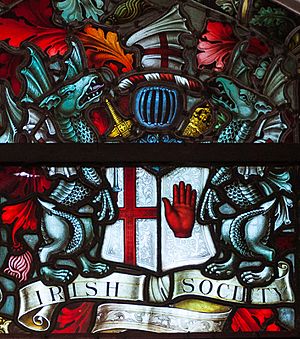The Honourable The Irish Society facts for kids

The Honourable The Irish Society is a special group of old London companies. They were set up a long time ago, in 1609, to help settle new people in an area of Ireland called County Londonderry. King James I officially started the group in 1613. In its early years, the society helped rebuild the city of Derry and the town of Coleraine. For hundreds of years, they owned land and fishing rights near these towns. Some of the money they made was used to help the local area grow and build things like roads. Some money also went back to the London investors, and some was used for charity work.
Today, the Irish Society is still active as a charity. It gives out grants (money) to help people and projects in County Londonderry and nearby areas. In 2020, they gave out about £580,000 in grants. They get most of their money from the property they still own, like the famous walls of Derry, which are a popular tourist spot. They also own fishing rights on the River Bann.
The society is based in the City of London, but they have a person who lives in Coleraine to represent them. The group is led by a Governor, who is usually a former Lord Mayor of London.
History of the Irish Society

A big war in Ireland, called the Nine Years' War, ended in 1603. After this, in 1607, many Irish leaders left the country. This meant that the northwest part of Ulster was open for new settlers. King James I wanted to make sure the area was safe from future attacks. He saw that the town of Derry was very important because it controlled the River Foyle. If the people there were against him, it could be a problem.
So, King James I asked the wealthy companies in the City of London to help pay for settling the area. This included building a new city with strong walls. This is how the Irish Society was created. Around the same time, a similar group called the Virginia Company of London was set up to settle North America.
The city of Derry was renamed Londonderry to show that the Irish Society, from London, had helped build it. The area around it, County Coleraine, was made bigger and also renamed County Londonderry. The countryside was divided among twelve large London companies, but the Irish Society kept control of the towns of Londonderry and Coleraine and their surroundings.
Over the years, the society faced some challenges. It was stopped for a while in 1630, fined in 1635, and shut down in 1637. But it was started again in 1650 by Oliver Cromwell and then again in 1662. The society also had arguments with the Bishop of Derry about who owned the fishing rights. These arguments even went to the highest courts in England and Ireland.
During the 1600s and 1700s, some of the twelve London companies sold their land. The Irish Society made sure they promised to cover any future problems. Later, in the 1800s, the other companies also made a lot more money from their land. Before a law in 1840, the society had a say in how the towns of Derry and Coleraine were run. They could even choose some officials.
In 1832, one of the companies, the Skinners' Company, started a legal case. They wanted a bigger share of the money the Irish Society was making. In 1845, the highest court, the House of Lords, made an important decision. They ruled that the Irish Society had to use its money and property to help everyone, not just the London companies. Since then, all the money the society makes has been used for charity.
Even though laws in the late 1800s made many companies sell their rural land to tenants, the Irish Society's property in the towns was different and didn't have to be sold. A report from a special group of politicians in 1889 said that the Irish Society had done a good job. It also mentioned that the other London companies had been very generous, building churches and schools, but that their giving had decreased.
The Irish Society paid for the building of Derry's Guildhall. Work began in 1887, and it opened in July 1890, costing £19,000. In 1923, the society sold most of its remaining property in Derry city to the government for £500,000. By the 2000s, the amount of property they owned was much smaller.
 | James Van Der Zee |
 | Alma Thomas |
 | Ellis Wilson |
 | Margaret Taylor-Burroughs |

